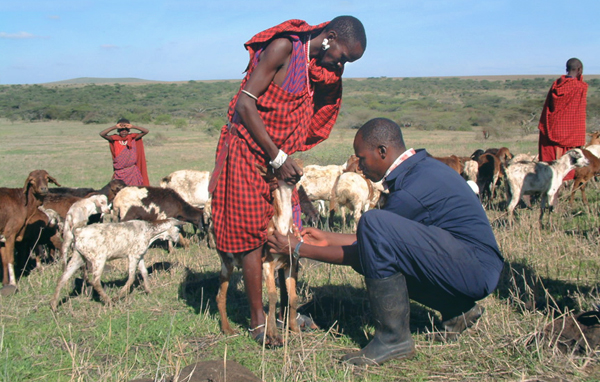Work in Developing Countries

The International Program of the Boyd Orr Centre is characterised by inter-disciplinary teams, working closely with government agencies and national academic institutions to tackle disease problems that affect health and development in resource-poor countries. The aim is to generate research outputs and build research capacity to support effective and sustainable management of infectious diseases that will result in tangible benefits for public health, livestock economies and biodiversity conservation.
A strong track-record and commitment to postgraduate training of national and international students is a major feature of the International Program. In common with the overall aims, projects within the International Program involve collaborative teams of medical scientists, veterinarians, molecular biologists, field ecologists, mathematical modellers, geographers and social scientists working to integrate data from molecular to landscape levels.
The International Program has a major focus of research in East Africa relating to four major themes:
- Epidemiology of zoonotic pathogens.
- Emerging infectious diseases.
- Management of diseases affecting endangered wildlife.
- Insect disease vector ecology and control.
Some of our key ongoing projects that embody the above themes include:
Serengeti Health Program
Serengeti Health Program
A major area of research activity in ecosystem health focuses on the Serengeti ecosystem, Tanzania. The Serengeti Health Program is working on several major diseases at the human-wildlife-domestic animal interface, including rabies, canine distemper, bovine tuberculosis, brucellosis, trypanosomiasis, anthrax and echinococcus. Key objectives have been to (a) to explore reservoir dynamics in complex, multi-host communities, (b) to identify risk factors for disease emergence, (c) to quantify disease burden, and (d) to optimise the design of disease control strategies.
The program operates under the auspices of the Tanzanian Wildlife Research Institute (www.tawiri.org) and Sokoine University of Agriculture, with collaboration of National Institute for Medical Research. The program works closely with government agencies in Tanzania (Ministry of Livestock Development and Fisheries, Ministry of Health and Social Welfare, TanzaniaNational Parks), conservation agencies (Frankfurt Zoological Society, Lincoln Park Zoo), academic collaborators (SheffieldUniversity, PrincetonUniversity, University of Minnesota, YaleUniversity) and industry (Intervet).
Integrated study of zoonotic pathogens in linked human and animal populations in rural Kenya
Integrated study of zoonotic pathogens in linked human and animal populations in rural Kenya
This project is integrated within the CDC/KEMRI International Emerging Infections Program focussing on zoonotic pathogens (IEIP-Z) in Asembo Bay, in western Kenya . The aim is to determine the relationship between outbreaks of zoonotic diseases in people and infection patterns in animals that are living in the same homesteads and community. This will allow us to quantify the burden of zoonotic diseases in rural communities, determine risk factors for people, understand animal-related factors driving disease emergence and evaluate different animal species as potential sentinels for early detection of disease.
Ecology and control of malaria mosquito vectors in east Africa
Ecology and control of malaria mosquito vectors in east Africa
Boyd Orr Centre members are involved in a collaborative research and training project with the Ifakara Health Institute in southern Tanzania. This internationally renowned African centre of excellence is situated within one of the malarious ecosystems on earth. This institute has a long history of conducting clinical, epidemiological and entomological research on malaria which has led directly to the development of intervention methods. Through our collaboration we are contributing a more detailed ecological and evolutionary perspective on mosquito vector behaviours and population dynamics which is being integrated with standard medical entomological approaches in a bid to identify improved methods for malaria transmission prediction and control. Particular focus rests on using empirical methods to identify the ecological and evolutionary determinants of key mosquito behaviours and fitness components that determine transmission intensity, and applying quantitative methods to examine their response to planned public health interventions or environmental change. This research also includes collaborators from the University of Dar es Salaam.

